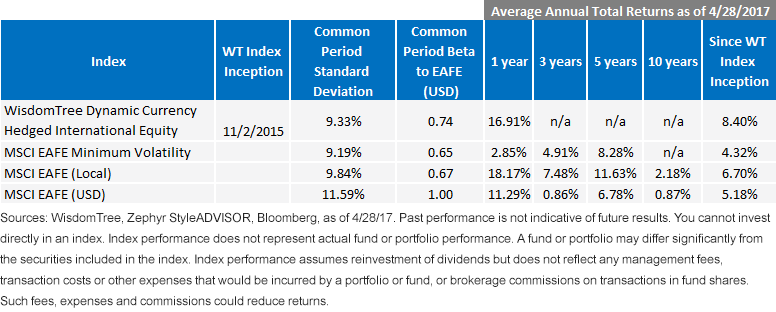Another Way to Lower Volatility in Developed Markets


One of the lessons learned over the past 10 years is that the U.S. equity market has great resiliency—even during periods when markets tank. Although the S&P 500 Index collapsed by more than 50% during the financial crisis, from the end of April 2007 through April 2017 the Index still managed to generate annualized returns of about 7.15%. That translates into a cumulative total return of nearly 100%. But for U.S. investors buying into broad developed world index funds tracking the MSCI EAFE Index, the last 10 years were disappointing. The MSCI EAFE Index, a broad index measuring the returns of developed world stocks outside the U.S. and Canada, returned just 0.87% on an annualized basis—or just over 9% on a cumulative basis.
Now that tide is beginning to turn. Thus far in 2017, developed world equity markets have outperformed the S&P 500. And based on year-to-date inflows, investors appear to be voting with their feet. WisdomTree estimates that $46 billion has flowed back into unhedged developed world equity funds, with $20 billion in new money flowing into the exchange-traded fund (ETF) industry’s three largest developed world equity ETFs. For investors who believe that many equity markets tend to revert to their long-term means over time, the paltry trailing 10-year returns for EAFE may mark this moment as a buying opportunity for long-term investors.
The flood of new money into unhedged developed world exposure indicates investors may now believe that foreign currency exposure could represent a source of positive returns, after serving as a headwind for much of the past six years. WisdomTree has provided research to show that, over long-term holding periods, currency exposure does not typically add return in a broad developed world equity exposure, but that foreign currency fluctuations do typically add to the volatility that must be endured to get that exposure. Over years and decades, currency has typically added or subtracted 7 to 8 percentage points to returns in any given year, which translated to between 2 and 3 percentage points of additional annualized volatility for international indexes.1
That raises an interesting question: Is hedging currencies potentially a more effective way of reducing volatility than trying to invest in less volatile stocks on an unhedged basis? Over the past few years, billions of dollars have flowed into lower-volatility ETFs, including those that provide exposure to the EAFE universe of stocks. But if we examine the table below, we notice there may be a much simpler way to reduce volatility in developed markets: managing the currency risk directly. While the WisdomTree Dynamic Currency Hedged International Equity Index has only a short real-time history, one of the striking characteristics it demonstrates has been its ability to reduce volatility compared to the unhedged MSCI EAFE Index.

Since November 2015, the WisdomTree Dynamic Currency Hedged International Equity Index has exhibited annualized standard deviation more than 2 percentage points less than that of the unhedged EAFE Index. That reduction of volatility, to 9.3%, was comparable to the reduction in volatility exhibited by the MSCI EAFE Minimum Volatility Index. The WisdomTree Index also generated a beta, a measure of market risk compared to EAFE, of just 0.74. However, that reduction in volatility did not come at the price of missing out on a meaningful portion of EAFE’s upside. While the MSCI EAFE Minimum Volatility Index returned just 2.85% over the prior year through the end of April, the WisdomTree Dynamic Currency Hedged International Equity Index returned 16.91%, outperforming an unhedged EAFE exposure by more than 5 percentage points. Since inception, WisdomTree’s dynamically hedged approach has beaten MSCI’s Minimum Volatility approach by more than 4 percentage points.
This is an important distinction because one of the risks associated with a low-volatility approach is that investors may be asked to take on too much “active risk” compared to a benchmark Index. This may result in the low-volatility strategy meaningfully underperforming the broader cap-weighted index during periods when equity markets levitate higher. The MSCI approach, which seeks to select stocks from countries that have demonstrated lower volatility compared to the broader EAFE universe, may inevitably lead to some large “country bets” compared to the broader cap-weighted universe the stocks are chosen from. By trying to manage currency risk directly—based on the value of a foreign currency compared to the U.S. dollar, the interest rate differential to the dollar and its price momentum compared to the dollar—WisdomTree tries to limit exposure to foreign currencies whose risks may outweigh their potential for future returns. Although the WisdomTree strategy does not seek to limit volatility directly, the effect of having a portion of the Index hedged compared to the dollar, which is typically the case, has helped the Index reduce risk, while providing broad exposure to developed world equity markets.
Conclusion
For investors looking to integrate a smart beta approach into their international equity allocations, the WisdomTree Dynamic Currency Hedged International Equity Fund (DDWM), which tracks the WisdomTree Index discussed above, after fees and expenses, provides broad dividend-weighted exposure to the developed world, while dynamically hedging foreign currency exposure on a monthly basis. While WisdomTree’s underlying Index seeks to add value by rebalancing back to a stock’s fundamental value based on the dividends companies pay, WisdomTree’s ability to dynamically hedge currency fluctuations may also help the strategy lower the overall volatility of the equity exposure—an innovation that may be helpful for investors seeking higher risk-adjusted returns.
1Sources: WisdomTree, Bloomberg.
Important Risks Related to this Article
There are risks associated with investing, including possible loss of principal. Foreign investing involves special risks, such as risk of loss from currency fluctuation or political or economic uncertainty. The Fund invests in derivatives in seeking to obtain a dynamic currency-hedge exposure. Derivative investments can be volatile, and these investments may be less liquid than other securities, and more sensitive to the effects of varied economic conditions. Derivatives used by the Fund may not perform as intended. A Fund that has exposure to one or more sectors may be more vulnerable to any single economic or regulatory development. This may result in greater share price volatility. The composition of the Index underlying the Fund is heavily dependent on quantitative models and data from one or more third parties, and the Index may not perform as intended. The Fund invests in the securities included in, or representative of, its Index regardless of their investment merit, and the Fund does not attempt to outperform its Index or take defensive positions in declining markets. Please read the Fund’s prospectus for specific details regarding the Fund’s risk profile.

